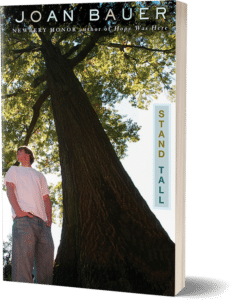“If you were to describe yourself in one word,” a seventh grade boy said to me when I visited his school, “what would it be?”
It was my fourth presentation of the day. I decided that incapacitated was the wrong answer.
“Overcomer,” I replied.
He smiled. It seemed he was an overcomer, too.
But how do we overcome?
I asked that question over and over when I was writing my latest book, Stand Tall. It’s a novel about a family turned upside down by divorce, turned right side up by humor, and challenged to renewal by the lessons of war.
We have seen profound tragedy these last months. Our memory banks are full. These are frightening and unsettled times that require a great deal of us all. We don’t know the effect that September 11 will have on our consciousness now or in three years or in twenty.
How do we help children work through loss, grief, fear, and confusion and steer them toward renewal? I think one of the ways is to offer them stories about surviving tough times and finding purpose and hope in the process.
And so I offer mine–a story about a boy and his Vietnam vet grandfather who learn that loss is a tunnel to healing, that grief isn’t the final word on life, and that being a hero sometimes comes down to harnessing the simple power of standing tall when you feel like slumping.
I created it to be a story that families can read and discuss together in this post 9.11 world. The longer I’m a writer, the more I believe that metaphor and story help us to learn deep truths. I believe in the power of intergenerational stories. I believe we need them now.
“Do you know the secret to fighting a war?” Grandpa asks. “You’ve got to hold onto the things you know to be true, set your mind to a higher place and fight like a dog to keep it there. War can be so fierce, you can forget the good. Forget what you’re about in this world, what’s really important. There’s always going to be somebody that’s going to try to make you forget it. Don’t let them.”
Writing Stand Tall was the most significant creative experience I’ve had to date in my career. I turned the first draft into my editor on September 8th. Then the world changed. Like everyone, I was trying to deal with the horror of what had happened while dealing with my own personal challenge. My family and I had sold our house in Connecticut and on September 14, three days after the attack, we moved into our new home in New York City. I will tell you honestly, I don’t know how we moved, but we did somehow in this cloud of fear and gratitude. My husband had been invited to the Windows on the World breakfast in the Trade Center on 9.11 — he didn’t go because we were moving. By the end of the week, Evan knew eight colleagues who had died.
It took a long time before I could focus on work and finish the book. There was too much pain, too much fear. But I knew somehow that this novel was going to help me work through it. My mother is a retired English teacher and I’ve always joked that I can smell a metaphor a mile off, even if the writer never intended there to be one. But this book of mine and the metaphors — dealing with war, emotional and otherwise, dealing with loss, divorce, physical limitations, disaster–every day I climbed up the stairs to my new studio that overlooks the Manhattan skyline and looked at the empty place where the towers used to be, and was reminded of what war does and how much it takes.
How do we overcome? That’s still the question. Stand Tall is my attempt to provide an answer.
